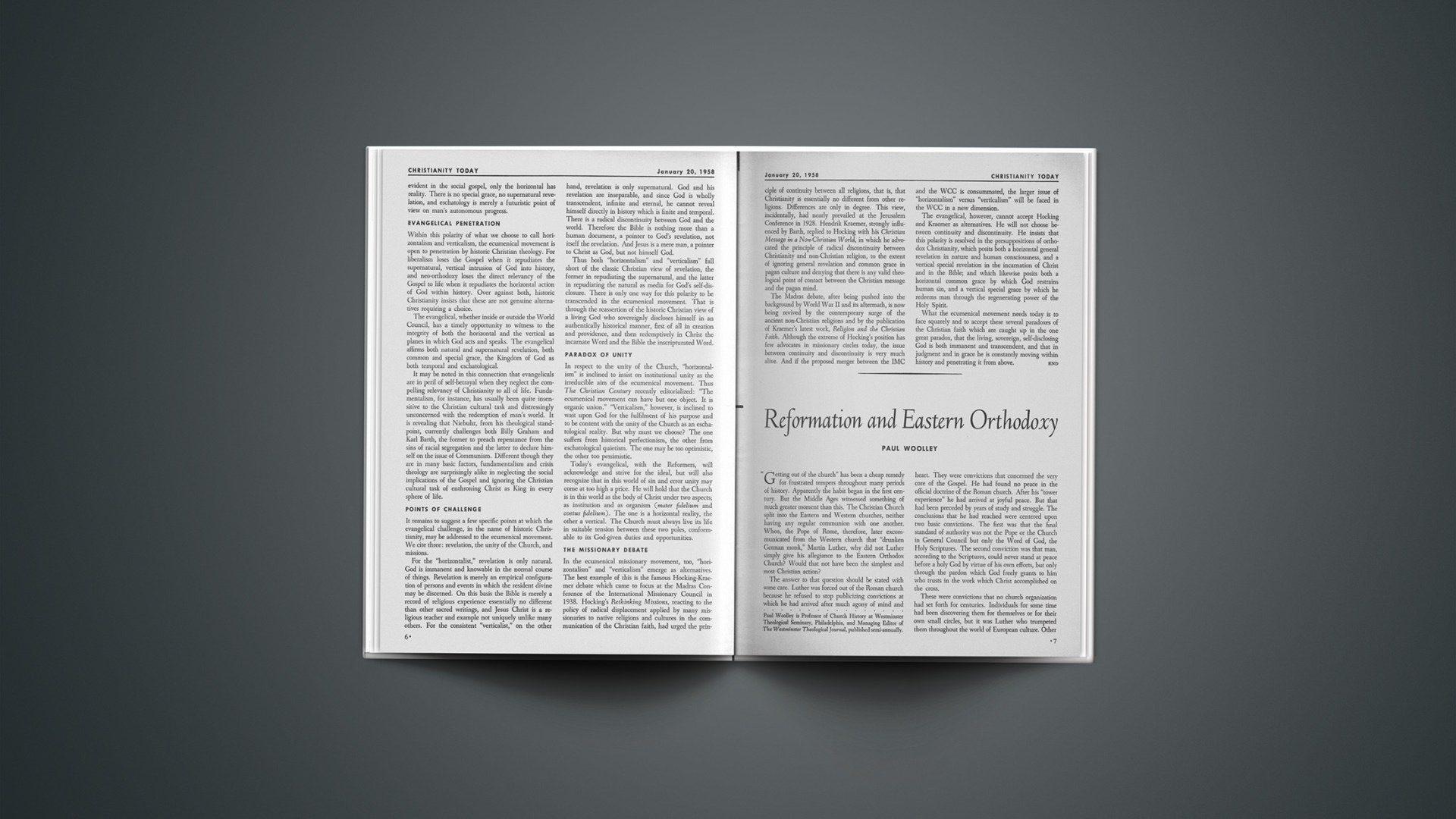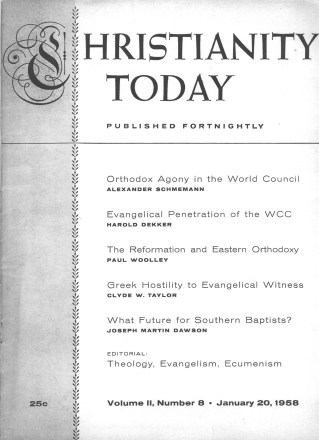“Getting out of the church” has been a cheap remedy for frustrated tempers throughout many periods of history. Apparently the habit began in the first century. But the Middle Ages witnessed something of much greater moment than this. The Christian Church split into the Eastern and Western churches, neither having any regular communion with one another. When, the Pope of Rome, therefore, later excommunicated from the Western church that “drunken German monk,” Martin Luther, why did not Luther simply give his allegiance to the Eastern Orthodox Church? Would that not have been the simplest and most Christian action?
The answer to that question should be stated with some care. Luther was forced out of the Roman church because he refused to stop publicizing convictions at which he had arrived after much agony of mind and heart. They were convictions that concerned the very core of the Gospel. He had found no peace in the official doctrine of the Roman church. After his “tower experience” he had arrived at joyful peace. But that had been preceded by years of study and struggle. The conclusions that he had reached were centered upon two basic convictions. The first was that the final standard of authority was not the Pope or the Church in General Council but only the Word of God, the Holy Scriptures. The second conviction was that man, according to the Scriptures, could never stand at peace before a holy God by virtue of his own efforts, but only through the pardon which God freely grants to him who trusts in the work which Christ accomplished on the cross.
These were convictions that no church organization had set forth for centuries. Individuals for some time had been discovering them for themselves or for their own small circles, but it was Luther who trumpeted them throughout the world of European culture. Other Reformers sprang to his side or in their own languages proceeded to spread to fellow countrymen in other parts of Europe the basic truths that Luther had made available for everyone.
The Eastern Church
But what about the Eastern Orthodox Church which for five hundred years had also shown little respect for the authority of the Roman pope now relegating Luther to outer darkness? Why did not Luther seek its support, its shelter, its co-operation?
What, in fact, had caused the Eastern church to cease recognizing the authority of Rome? Was its action based on an earlier Reformation than the Protestant one of the sixteenth century? What had caused the separation? There has not always been agreement on the answer to that question.
Forsaking The Apostles
One of the first reactions which a man has when he studies the history of the ancient church is surprise that the leaders and mentors of the church should have departed so soon and so thoroughly from the teaching of the Apostle Paul. The most obvious area where this occurred was where salvation was the subject of discussion. Justin in the mid-second century clearly thought that the major element in the pursuit of salvation was the Christian’s obedience to the moral law. Irenaeus saw Christ as the founder of a new race of men, one who led men upward as Adam had led them downward. Men were free to choose Christ as their leader, to unite with him and follow him.
Tertullian talked of man as saved by grace. But grace, he believed, served to support man’s will so that through his good works he might obtain the reward of eternal life. In other words, man had to add to the work of Christ at the Cross. To Clement of Alexandria Greek philosophy was a justifying covenant with God, even though that idea was dimly comprehended. Man, with his free spirit, was enlightened by the Logos to choose truth and love for himself.
In Origen we meet a universalism. Even the demons were to be ultimately restored to union with God, and purging fire was to aid all men, good and evil, toward that end. Universalism reappeared again, in the fourth century, in Gregory of Nyssa. His view of salvation was synergistic. Man was carrying on a great moral drive toward salvation, with God stepping in and assisting him in the effort.
From this brief summary it appears that the early fathers of the Eastern church did not follow apostolic teaching in the matter of salvation, and it was of apostolic teaching that Martin Luther was so forcibly reminding the church at the time of the Protestant Reformation. To some extent this reminder had been given to the church of the West by St. Augustine in the fifth century. But the East had paid little attention to Augustine; original sin, for instance, was regarded as a Western disease.
As a result of their variable doctrines, the East tended to lay greater and greater emphasis on man’s co-operation with God in the matter of salvation. The resurrection came to be stressed more strongly than the atoning significance of Christ’s death. And Christ’s death came to be considered the Christian’s victory over corruption and death, the attainment of which was dependent upon the vigor with which it was pursued in life or upon purgatorial process after death.
Between East And West
Difficulties in the relationship between the Bishop of Rome and the Bishop of Constantinople became apparent by the fifth century. It is not possible to lay them at the feet of any one cause. But the rift persisted until in the year 1054 Pope Leo IX excommunicated the Patriarch of Constantinople. Despite several attempts at reunion, some momentarily successful, the division continued from that time forward. Various reasons for the breach were offered. The West was charged with the use of unleavened bread in the supper, with the introduction of “filioque” into the Nicene creed. The East was told that it had priests who were married and that the Patriarch of Constantinople called himself an “ecumenical patriarch.” However, neither the time nor the immediately proffered reasons were actually important. The division was the result of a long historical struggle which had gradually become more and more implacable. What was important were two fundamental differences: the Eastern church did not acknowledge the supreme authority of the Pope of Rome, and it did not see, even as imperfectly as did Rome, the importance of the scriptural teaching that man is “dead in trespasses and sins” (Eph. 2:1). Therefore, the separation was not based upon the reluctance of the Eastern church to modify its doctrine of salvation to Rome’s.
Martin Luther, seeking support for his recovery of the scriptural treasure of justification by faith alone could find, then, no encouragement for his stand from the bishops of the Eastern church. Neither the sole authority of Scripture nor the truth of justification by faith were at home there.
The Fate Of Cyril
A demonstration of this fact was provided a century later in the tragedy of an Eastern Orthodox theologian, Cyril Lucar. Cyril was a native of Crete. For a time Patriarch of Alexandria, he became in 1621 Patriarch of Constantinople. As a young man he had studied in Italy, but it was in later years that he came to the conviction that the Reformation provided a true statement of the faith. In 1629 he published a confession of his belief in which he stated clearly that the authority of the Scriptures is superior to the authority of the church. The Scriptures are inerrant, the church is not. The confession also affirmed that “man is justified by faith, not by works” (Ch. 13). What more could be desired for determining the true stand of the Eastern church? But behold! Cyril was charged with being a Lutheran, and his enemies succeeded in securing his deposition from the patriarchate. He obtained reinstatement, and on four more occasions this same cycle was repeated. At last, on a charge of high treason, he was strangled. Cyril, however, had disciples who, with views favorable to the Protestant Reformation, continued to reappear again and again in the Eastern church. To ward off the effects of their influences, four different synods condemned Protestant tendencies during the remainder of the seventeenth century, at Constantinople in 1638, at Jassy in 1642, at Jerusalem in 1672 and at Constantinople again in 1691.
Reformation Unwelcome
It must be concluded, regretfully, that Protestantism failed in bringing scriptural truth to bear effectively on the larger number of Easterners. There appears to have been no notable hostility on the part of the Reformers to the Easterners. Calvin had written a preface to a collection of Chrysostom’s sermons, and in it he spoke highly of the services of John “the Golden-Mouthed” and incidentally commended other early Eastern fathers. But in no way did the Eastern Orthodox church prove hospitable to the doctrines of the Reformation. The Reformation and those like Cyril who sought to forward it were unwelcome to the Eastern church and this has, tragically, continued so to be.
Paul Woolley is Professor of Church History at Westminster Theological Seminary, Philadelphia, and Managing Editor of The Westminster Theological Journal, published semi-annually.










